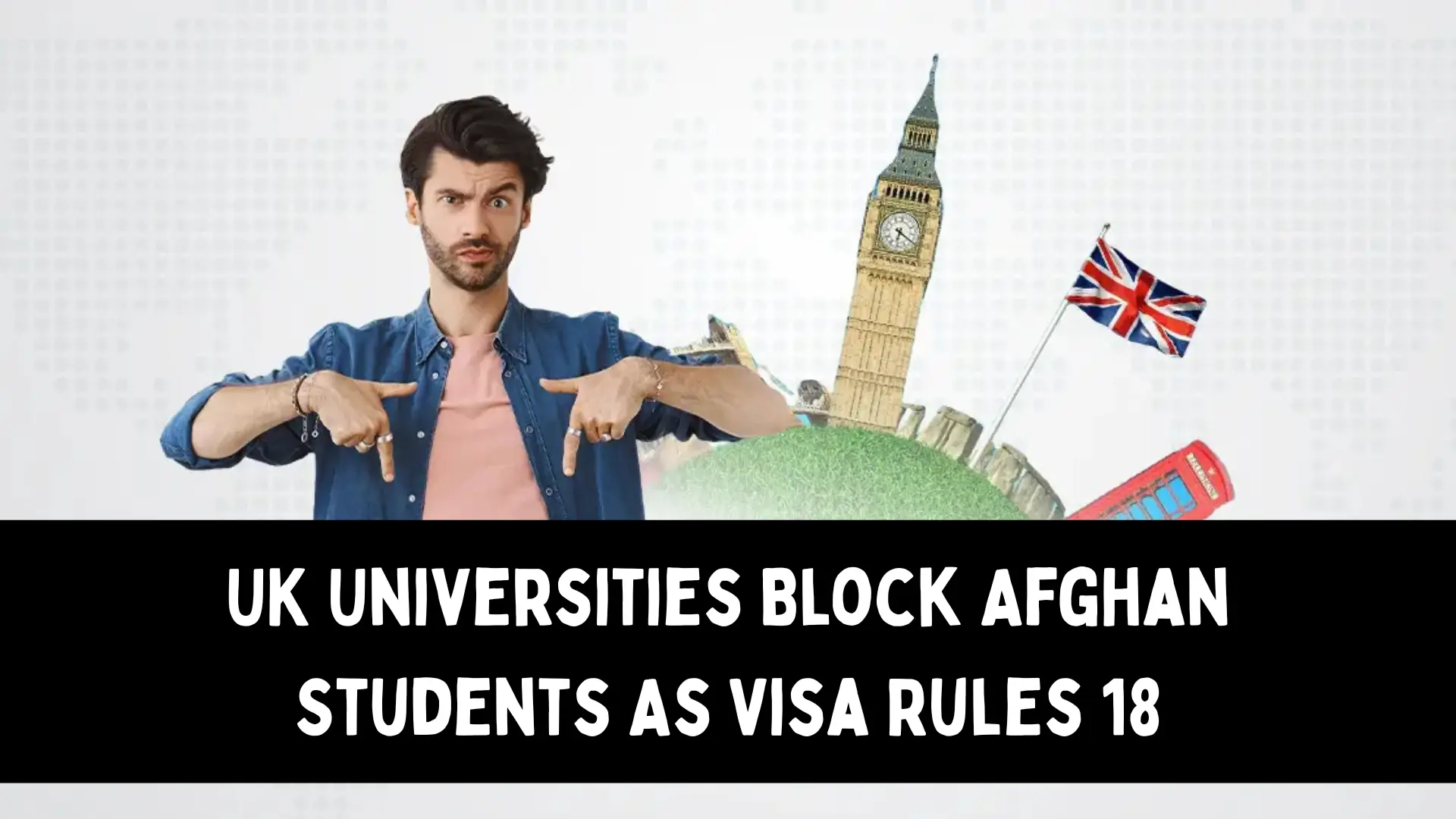SUK Universities Block Afghan Students As Visa Rules 18. ome UK higher education institutions have stopped accepting applications from students based in Afghanistan, while others are imposing tighter restrictions. The move comes amid growing concerns that the Home Office will revoke licences of institutions that engage in “risky” recruitment practices. This article explores what is happening, why this change is taking place, and what it means for Afghan students seeking study opportunities in the UK.
Why Are UK Universities Restricting Afghan Student Applications?
There are multiple reasons driving these restrictions:
- The UK government is under pressure to reduce net migration, including cases where student visas lead to asylum claims.
- The Home Office has signalled that universities who recruit large numbers of international students must meet performance thresholds (for example starting and graduating rates) or face loss of their licence to sponsor international students.
- For Afghanistan specifically, the situation of students is complicated by security, travel, and diplomatic issues. Some scholarship schemes have been suspended or frozen.
These factors combined mean that universities are being cautious about recruiting from Afghanistan, especially where the process of obtaining visas, verifying documentation and travel remains uncertain.
What This Means for Afghan Students
If you are an Afghan national hoping to study in the UK, here are some of the consequences:
- Some universities may not accept applications from students still based in Afghanistan.
- Even if applications are accepted, you may face longer visa processing times, more scrutiny of your documentation, or outright refusal.
- Scholarships and support schemes previously available may now be on hold or restricted for Afghan applicants. For example, the Chevening Scholarship programme is not currently accepting Afghan candidates for 2025/26.
- It may become harder to obtain a confirmed place, or the university may require proof of ability to travel, to obtain visa interviews outside Afghanistan, and assurances of arrival.
Latest Visa Rules & Immigration Policy Changes
The Wider Context
The UK government has recently introduced changes to the immigration rules, and student visas are part of it. For example:
- On 24 June 2025 and 1 July 2025, statements of changes to immigration rules were published, affecting dependants of students, and some of the student routes.
- There is a move to target visa applications from nationals of certain countries considered at greater risk of overstaying or claiming asylum, which affects universities’ international recruitment.
Impact for Universities
Universities now face clear performance thresholds for their international student intake. According to reporting:
- At least 95% of admitted foreign students must actually begin their courses.
- At least 90% should complete their courses.
- If more than 5% of visa applications are rejected, the university may be penalised or lose its ability to sponsor international students altogether.
These rules make institutions more cautious about admitting students from higher-risk regions or where visa routes may be fragile — such as Afghanistan.
Key Facts at a Glance
| Fact | Details |
|---|---|
| Some UK universities stop Afghan applications | Institutions pause or restrict applications from Afghanistan due to risk of visa/immigration issues |
| Visa rules tightening | Home Office sets new thresholds and scrutiny for international student routes |
| Chevening scholarships for Afghans suspended | For 2025/26 intake, Afghan candidates excluded from this major UK scholarship scheme |
| Travel & visa centre issues for Afghanistan | There are very few functioning visa application centres inside Afghanistan for UK visa |
| Universities’ risk of losing sponsor licence | Institutions with weak performance on visa cohorts face sanctions |
Why Are Afghan Students Particularly Affected?
Several specific factors make Afghan students more vulnerable in this context:
- The security and governance environment in Afghanistan, and the fact that many students may be based in-country or in transit, raise complications for visa processing, travel, documentation.
- There are significant delays and risks for visa application centres, verification of records, and ability to depart from Afghanistan.
- Some scholarship and support schemes that previously served Afghan nationals have been suspended or frozen, reducing pathways and support.
- Given the heightened focus by the Home Office on migration risk and asylum claims, nationals of countries with higher refugee/asylum flows are under more scrutiny — Afghanistan being one of them.
All of this means that UK universities and visa authorities may treat Afghan applications with greater caution, or may temporarily suspend intake until conditions stabilise.
What Can Afghan Students Do?
If you are an Afghan student seeking to study in the UK, here are practical steps:
- Check if the university you are applying to still accepts applications from Afghanistan or those based there. Contact their international admissions office directly.
- Make sure your documents are complete and verifiable: passport, previous education certificates, English proficiency, finance proof.
- Be prepared for longer processing times and possibly needing to travel to a third country for visa interview or biometric appointment.
- Explore alternative routes: if direct admission from Afghanistan is blocked, look at universities in other countries, or programmes for Afghan nationals in diaspora.
- Monitor official UK government and Home Office updates — the rules are changing and you want to act on the most recent information.
Implications for Universities and the Higher-Education Sector
From the UK university side:
- Institutions must tighten their admissions and recruitment processes for international students, and especially from “high risk” countries.
- They must ensure compliance with visa sponsor licence obligations and performance thresholds; failing to do so may lead to sanctions.
- They may face financial implications: international student fees represent a large portion of many universities’ income; restricting access for certain nationalities may impact revenue.
- Reputation risk: recruiting students who cannot obtain visas or get stuck in procedural limbo can damage an institution’s standing.
Conclusion
The policy landscape in the UK for international students — and specifically for Afghan students — is becoming more restrictive. Some universities are choosing to block or pause applications from Afghan-based students, driven by tighter visa rules, Home Office pressures, and the risk of institutional licence sanctions. For Afghan students, this means additional challenges, more uncertainty and the need for careful planning.
While the UK remains an attractive destination for global students, only those who are well-prepared, well-documented and able to navigate the changed environment will have the best chance of success. For universities, the message is clear: international recruitment must be secure, compliant and well-managed to retain their right to sponsor.
FAQs
Q1. Why are UK universities stopping applications from Afghan students?
Because visa and immigration rules are tightening, and universities fear losing their sponsor licence if their international student cohorts show high refusal or drop-out rates.
Q2. Can Afghan students still apply to UK universities?
Yes — but many face additional barriers: fewer scholarships, longer processing times, stricter documentation and in some cases universities not accepting applications from students in Afghanistan.
Q3. Will this change be permanent?
It is uncertain. The university recruitment and visa environment is evolving. If conditions in Afghanistan or UK visa policy change, access may improve. However, for now the environment remains more restrictive.

















